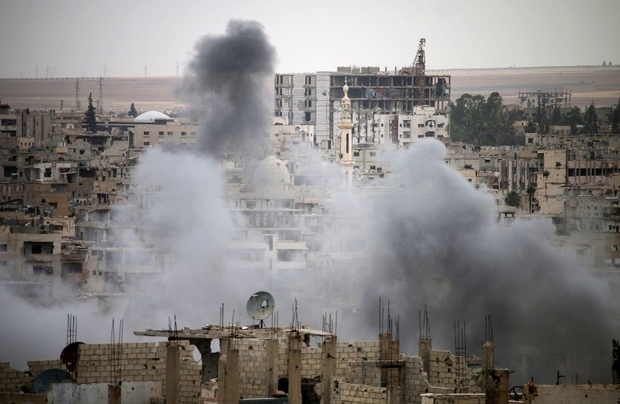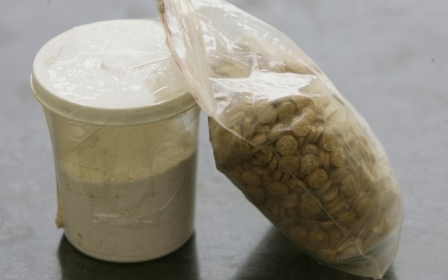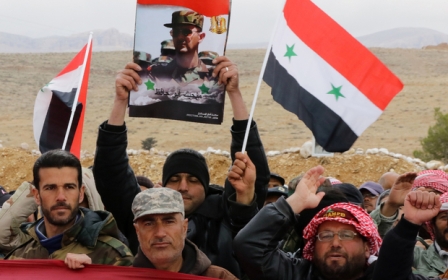Syrian forces press southwest assault, defying US

Syrian government helicopters dropped barrel bombs on opposition areas in the southwest on Friday for the first time in a year, a war monitor and rebel officials said, in defiance of US demands that President Bashar al-Assad halt the assault.
Assad has sworn to recapture the area bordering Jordan and the Israeli-occupied Golan Heights and the army began ramping up an assault there this week, threatening a "de-escalation" zone agreed by the United States and Russia last year.
Washington on Thursday reiterated its demand that the zone be respected, warning Assad and his Russian allies of "serious repercussions" of violations. It accused Damascus of initiating air strikes, artillery and rocket attacks.
US Ambassador to the United Nations Nikki Haley said on Friday that the Syrian military escalation "unambiguously violates" the de-escalation arrangement and that more than 11,000 people had already been displaced.
"Russia will ultimately bear responsibility for any further escalations in Syria," Haley said in a statement.
A big offensive risks wider escalation that could draw the United States deeper into the war. The southwest is of strategic concern to US ally Israel, which has this year stepped up attacks on Iran-backed militias allied with the Syrian government.
On Friday, UN Secretary-General Antonio Guterres called for an immediate end to military escalation in the area.
"The attacks have resulted in the displacement of thousands of civilians, the majority of whom are moving towards the Jordanian border. The secretary-general is also concerned at the significant risks these offensives pose to regional security," Stephane Dujarric, Guterres's spokesman, said in a statement.
The barrel bombs targeted a cluster of rebel-held towns including Busra al-Harir northeast of Daraa city, where the government attack threatens to bisect a finger of rebel ground jutting northwards into land held by the government.
The Syrian Observatory for Human Rights, a Britain-based war monitor, said Syrian government helicopters had dropped more than 12 barrel bombs on the area, causing damage but no deaths.
Abu Bakr al-Hassan, spokesman for the rebel group Jaish al-Thawra, which fights under the banner of the Free Syrian Army (FSA), said the munitions had been dropped on three towns and villages, and that war planes had hit another.
"I believe [the bombardment] is testing two things: the steadfastness of the FSA fighters and the degree of US commitment to the de-escalation agreement in the south," he told Reuters.
Syrian state television said on Friday that army units had targeted "lairs and movements of terrorists" in the area.
Russia's ambassador to Lebanon was quoted as saying that Moscow was helping Damascus to recapture the south.
"The Syrian army now, with support from Russian forces, is recovering its land in the south and restoring the authority of the Syrian state," Alexander Zasypkin told the pro-Hezbollah newspaper al-Akhbar.
"Israel has no justification to carry out any action that obstructs the fight against terrorism," he said.
Israel, which has warned against Iranian and Hezbollah military presence in southern Syria, has bombed Iran-backed forces throughout the country over the past few years.
Russian Foreign Minister Sergei Lavrov said earlier this month that only Syrian government troops should have a presence on the country's southern border near Israeli-controlled territory.
On 15 June, Israeli Prime Minister Benjamin Netanyahu and Russian President Vladimir Putin "discussed the developments in Syria in the context of joint efforts to provide security near the Syrian-Israeli border" in a phone call, according to a statement released by the Kremlin.
New MEE newsletter: Jerusalem Dispatch
Sign up to get the latest insights and analysis on Israel-Palestine, alongside Turkey Unpacked and other MEE newsletters
Middle East Eye delivers independent and unrivalled coverage and analysis of the Middle East, North Africa and beyond. To learn more about republishing this content and the associated fees, please fill out this form. More about MEE can be found here.




